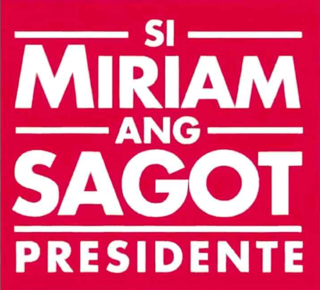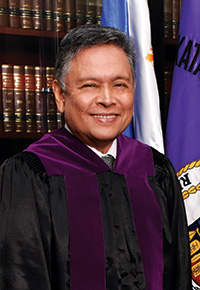Related Research Articles
Telecommunications in the Philippines are well-developed due to the presence of modern infrastructure facilities. The industry was deregulated in 1995 when President Fidel Ramos signed Republic Act 7925. This law opened the sector to more private players and improved the provision of telecom services are better and fairer rates, leading to the creation of many telecommunication service providers for mobile, fixed-line, Internet and other services.

Ferdinand Emmanuel Edralin Marcos Sr., was a Filipino politician and lawyer who was the 10th president of the Philippines from 1965 to 1986, widely considered by academics, economists, and journalists as a kleptocrat. He ruled as a dictator under martial law from 1972 until 1981 and kept most of his martial law powers until he was deposed in 1986, branding his rule as "constitutional authoritarianism" under his New Society Movement. One of the most controversial leaders of the 20th century, Marcos' rule was infamous for its corruption, extravagance, and brutality.

Ferdinand Romualdez Marcos Jr., commonly referred to as Bongbong Marcos and by his initials, BBM, is a Filipino politician who served as a senator from 2010 to 2016. He is the second child and only son of former president and dictator Ferdinand Marcos Sr. and former First Lady Imelda Romualdez Marcos.

Gregorio Ballesteros Honasan II, better known as Gringo Honasan, is a Filipino politician and a cashiered Philippine Army officer who led unsuccessful coups d'état against President Corazon Aquino. He played a key role in the 1986 EDSA Revolution that toppled President Ferdinand Marcos.
"Operation Big Bird" was the attempt of the Philippine Government during the presidency of Corazon Aquino to recover the alleged US$7.5 billion of hidden accounts and assets of President Ferdinand Marcos and his family in the Swiss banks. Conceived by Philippine banker Michael de Guzman, it commenced shortly after Marcos was forced into asylum in the United States. Initially, Operation Big Bird did not recover any money with two differing reports by Representative Victorio Chaves and Senator Jovito Salonga. Chaves laid the blame upon Salonga, Solicitor-General Sedfrey Ordoñez and the Swiss bank lawyers. Salonga countered that Ordoñez had prevented the Philippine government from losing a large sum of money. Evidence suggests that de Guzman acted in good faith on behalf of the new government but that a double cross may have been present.
The Presidential Commission on Good Government (PCGG) is a quasi-judicial government agency of the Philippines whose primary mandate is to recover ill-gotten wealth accumulated by Ferdinand Marcos, his immediate family, relatives, subordinates and close associates, whether located in the Philippines or abroad. It was created by President Corazon Aquino shortly after she was sworn in as president in the aftermath of the 1986 People Power revolution. In addition to recovering the Marcos wealth, it is also tasked with investigating other cases of graft and corruption; and instituting of corruption prevention measures.
The Coco Levy Fund Scam was a controversy in the 1970s and 1980s in the Philippines involving former President Ferdinand Marcos and his cronies. It is alleged that Marcos, Danding Cojuangco, Juan Ponce Enrile, and others conspired to tax coconut farmers, promising them the development of the coconut industry and a share of the investments, but on the contrary were used for personal profit particularly in the purchase of United Coconut Planters Bank (UCPB) and majority stake in San Miguel Corporation (SMC), to name a few.
Ramón Pereyra Jacinto, best known by his initials RJ, is a Filipino businessman, musician and radio TV personality. He previously served as Undersecretary for Government Digital Broadcast Television and the Digitization of the Entertainment Industry Sector in Department of Information and Communications Technology. He is also the founder and chairman of Philippine rock-and-roll radio station DZRJ and the Rajah Broadcasting Network.

The space program of the Philippines is currently maintained by the Philippine Space Agency (PhilSA) together with various agencies under the Department of Science and Technology (DOST). The space program includes space research and development, and is funded through the National SPACE Development Program (NSDP) by the DOST and received an initial budget of ₱1 billion in 2020.

The 2016 presidential campaign of Miriam Defensor Santiago, a then-incumbent Senator of the Philippines, was announced on October 13, 2015 at a book signing event. Miriam Defensor-Santiago submitted her certificate of candidacy (COC) on October 16, 2015. She was fifth overall in the election and lost to Rodrigo Duterte. Santiago died of lung cancer five months later.

Noel Gimenez Tijam is a Filipino lawyer who served as Associate Justice of the Supreme Court of the Philippines from March 8, 2017, until January 5, 2019. Prior to his appointment, he was a justice of Court of Appeals from 2003 to 2017.
The term "Marcos mansions" refers to at least 50 upscale residences in the Philippines of the family of President Ferdinand Marcos. These are aside from the various overseas landholdings of the Marcos family, which are spread around the world. The Supreme Court of the Philippines considers these landholdings as part of the "ill-gotten wealth" of the Marcos family, based on the definitions set forth in Republic Act No. 1379, which had been passed in 1955.
Rodolfo Cuenca, sometimes known by his nickname, Rudy Cuenca, is a Filipino businessman best known as the former chairman of the Construction and Development Corporation of the Philippines (CDCP), which is known today as the Philippine National Construction Corporation. He was a close associate of Ferdinand Marcos, and is noted not to be embarrassed by "his much-criticized close association with Marcos and his being tagged as a crony."
Certain associates of former Philippine President Ferdinand Marcos, historically referred to as the Cronies of Ferdinand Marcos or using the catchphrase "Marcos cronies", have benefited from their friendship with Marcos – whether in terms of legal assistance, political favors, or facilitation of business monopolies, during his administration. Marcos critics, and the local and international press began referring to these individuals as "cronies" during the latter days of the Marcos dictatorship, and the Philippine government – especially the Presidential Commission on Good Government (PCGG) – continued using the term after the ouster of Marcos in 1986.
Jose Yao Campos, also known by his Chinese name Yao Cho Liat, was a Filipino businessman best known as the founder of United Laboratories (UNILAB). He became an early supporter of Philippine president Ferdinand Marcos, who tapped him as a "financial advisor." In 1986, the Presidential Commission on Good Government (PCGG) cited him for having served as a "front man" for various "ill-gotten" wealth, including $52.5 million of real estate representing the most prominent Marcos Mansions. He became the first of the Marcos cronies to make a deal with the PCGG in exchange for immunity from suit. By the time he died in 2006, his family had become one of the Philippines' most powerful business clans, with UNILAB helmed by his firstborn, Joy Campos Hess and her son, Clinton Hess. His eldest son Joselito Campos founded condiments company Nutri-Asia and acquired in Del Monte Philippines and Del Monte Pacific; and his youngest child Jeffrey Campos running Greenfields Development Corporation.

The Marcos jewels generally refers to the jewelry collection of the Marcos family – most famously that of former First Lady Imelda Marcos. However, it also specifically refers to three collections of jewelry which were recovered by the Presidential Commission on Good Government (PCGG) in 1986, which the Philippine Supreme Court had ruled to be part of the Marcoses' unlawful wealth.

The Marcos family, a political family in the Philippines, owns various assets that Philippine courts have determined to have been acquired through illicit means during the presidency of Ferdinand Marcos from 1965–1986. These assets are referred to using several terms, including "ill-gotten wealth" and "unexplained wealth," while some authors such as Philippine Senator Jovito Salonga and Belinda Aquino more bluntly refer to it as the "Marcos Plunder."
Eastern Telecommunications Philippines, Inc. (ETPI), doing business as Eastern Communications, is a telecommunications company in the Philippines jointly owned by PLDT and Globe Telecom through its own subsidiary, Vega Telecom. Founded in 1878 during the final years of the Spanish colonial era, it was the first company to provide telegraphic services.
The distortion, falsification, or whitewashing of the historical record regarding Ferdinand Marcos, sometimes referred to using the phrases "historical denialism," "historical negationism," or sometimes erroneously "historical revisionism," is an academically documented phenomenon linked to the return of Marcos' immediate family and political allies to government positions, as well as the hero's burial of Marcos himself in 2016. It continues Marcos' own efforts to create a cult of personality for himself, which in itself involved various forms of historical distortion.

Estelito "Titong" Patdu Mendoza is a Filipino lawyer who served as Solicitor General of the Philippines from 1972 to 1986. As Solicitor General, he successfully defended the validity of the 1973 Constitution of the Philippines in the Ratification Cases. He was the Chairman of the United Nations General Assembly Legal Committee in 1976. He also served as Minister of Justice from 1984 to 1986, Member of the Batasang Pambansa from 1978 to 1980 and 1984 to 1986, and Provincial Governor of Pampanga from 1980 to 1984. He is also the Founding Partner of Estelito P. Mendoza & Associates.
References
- ↑ "Contact Us". Philippine Communications Satellite Corp. Retrieved 10 March 2020.
- ↑ Supreme Court Decision G.R. No. 174462, February 10, 2016. Philippine Supreme Court E-Library. 2016. Retrieved 10 March 2020.
{{cite book}}: CS1 maint: date and year (link) - ↑ "May 3, 1968 Marcos opens satellite station". Manila Times. 3 May 2011. Retrieved 14 December 2017.
- ↑ "REPUBLIC ACT NO. 5514, June 21, 1969". Philippine Supreme Court E-Library. 21 June 1969. Retrieved 23 July 2019.
- ↑ Nicolas Cigaral, Ian (15 March 2019). "Duterte signs law extending PHILCOMSAT franchise". Philippine Star. Retrieved 10 March 2020.
- 1 2 Scott, Ann (1986-03-17). "U.S. auditors to examine documents related to Philippines' alleged diverted funds". UPI. Retrieved 2022-02-22.
- ↑ Butterfield, Fox (1986-03-30). "Marcos's Fortune: Inquiry in Manila Offers Picture of How It Was Acquired". The New York Times. ISSN 0362-4331 . Retrieved 2022-02-22.
- 1 2 Punzalan, Jamaine (2016-11-22). "No 'Martial Law' babies: Imee, Bongbong held key posts under dad's rule". ABS-CBN News. Retrieved 2022-02-22.
- ↑ "BIR sues 3 former Philcomsat executives". Philippine Daily Inquirer. March 25, 2011. Retrieved March 10, 2020.
- ↑ "Supreme Court Decision G.R. No. 174462, February 10, 2016". Philippine Supreme Court E-Library.
- ↑ "G.R. No. 174462 - PHILIPPINE OVERSEAS TELECOMMUNICATIONS CORPORATION (POTC), PHILIPPINE COMMUNICATIONS SATELLITE CORPORATION (PHILCOMSAT), PETITIONERS, VS. SANDIGANBAYAN (3rd DIVISION), REPUBLIC OF THE PHILIPPINES REPRESENTED BY PRESIDENTIAL COMMISSION ON GOOD GOVERNMENT (PCGG), RESPONDENTS.D E C I S I O N - Supreme Court E-Library". elibrary.judiciary.gov.ph. Retrieved 2020-03-10.
- ↑ "Philcomsat Management". Philcomsat Website. March 10, 2020.
- ↑ "DICT & UNDP Award Contract to Connect 3,000 Remote Locations with Free Internet". United Nations Development Program (UNDP). October 10, 2019.